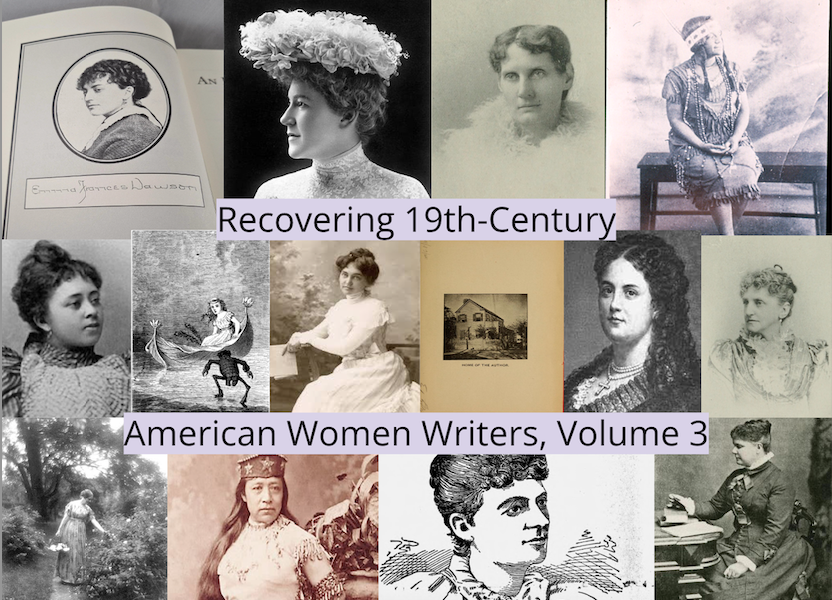
Image Source: https://www.google.com/search?q=lillie+devereux+blake&rlz=1C1GCEA_enUS1035US1035&source=lnms&tbm=isch&sa=X&ved=2ahUKEwj3kNOl4-X7AhV6FFkFHfQdBugQ_AUoAXoECAIQAw&biw=1920&bih=961&dpr=1#imgrc=8EDPrcR-Bdz_TM
Biographical Information
Lillie Devereux Blake was a fiction writer, poet, journalist, essayist, and cultural critic of social norms regarding women. Blake was born on August 12, 1833, in North Carolina and died on December 30, 1913, in Englewood, New Jersey at the age of 80, leaving her daughters Elizabeth Devereux Blake and Katherine Devereux Blake to follow her legacy.
In regards to Blake’s writing career, she began after marrying Frank Umsted and having her daughters Elizabeth in 1857 and Kate in 1858 (Farrell 147). Most of the pieces Blake wrote about were regarding gender issues, including her novel Southwold (1859). Although Blake did speak out about gender issues, Blake took into consideration the limitations imposed during her time. Therefore, it is no surprise that for some time she wrote under the name Essex to be “cloaked under a male-sounding name which allowed her safe passage between a woman’s world of popular fiction and the mixed audience of the War Press,” which was a way to bring her writing into the male arena (148).
Furthermore, Blake’s activist life started in 1869 when she arranged conventions, wrote articles, made lecture tours, organized public meetings, and more. Blake was also a leader in the National Woman Suffrage Association and was a person who broke the status quo through her stance portrayed in her writing regarding the circumstance of women’s lives (Alexander 36). Blake also made an application for the opening of Columbia College which would be available for both young men and women, which was not the norm in a time period where women could not receive education (Alexander 37-38). Consequently, she led a rise of co-education and the founding of Barnard College.
Southwold
The text I recovered was Southwold (1859) by Lillie Devereux Blake. The novel is about nineteenth-year-old main character Medora Fielding and her responsibility to marry someone rich. However, Medora loves and wants to marry a poor man named Walter Lascelles until she hears through her mother that Lascelles had been seen charming a lady named Lucy Wentworth, to whom he gets engaged. Medora feels betrayed even when Lascelles explains that it is only for money not love because he knows that without money Medora and he can’t get married so he chose his next best option. Still, Medora is heartbroken and through her heartbreak, she seeks another man to marry.
During this, Lucy and Lascelles get married, and quickly that marriage goes from sweet to sour since Lascelles only married Lucy for money so after they got married he ignored her, was rude to her, wastes all her money, gave all his love and attention to Medora, etc. Through this unhealthy marriage, Lucy Wentworth serves as an example of a woman being raised to be a wife and mother as the only livable option in life and how it led her to a horrible marriage she was unable to escape. Consequently, Lucy suffers the negative effects marriage can have on women until she dies because of it. As the story progresses, Lucy changes from the radiant and bubbly character she was to a sad, hurt, and scared wife throughout her horrible marriage with Lascelles. Yet Lucy couldn’t do much but endure it due to the lack of options for women in the nineteenth century, laws preventing divorce, lack of education, and more. Toward the end of Lucy’s life, she gives birth to a baby who was born sick due to Lucy’s ill status, and although the baby gave Lucy some happiness it was not enough to overcome the suffering Lascelles kept putting her through. Towards the end, Lucy and the baby die leading Lascelles to come back home to worry about how he will keep the money now that they died. Basically, Lascelles lies about when the baby died to find a loophole in order to keep the money. However, he does end up losing the money and gets outcasted by society in the end when he gets caught.
Throughout all this Medora meets a young man named Floyd and although Medora would like to marry Floyd, she still seeks a man who has money. Although Floyd is part of the rich Southwold family, Mr.Southwold, Floyd’s uncle, is the one who has the money and will only give it to Floyd if he does not marry. Still, Floyd tells his uncle of his plan to marry Medora, to which he replies by letting him know that he will not inherit the money. Floyd reasons with his uncle requesting him to meet Medora first, to which his uncle agrees. They gather together with others including Lascelles who was there to win over Medora now that he had money due to his wife and baby dying. Overall, in the end, Mr. Southwold does not change his mind which does not work for Medora. Towards the end after talking to Lascelles outside, Mr. Southwold encounters Floyd and Medora and they start discussing the whole situation of the money and the marriage. During this, Mr. Southwold falls back and gets hit on some rocks leaving him injured. Medora tells Floyd to let him die because he was the only obstacle in their way. Floyd hesitates as he hears Medora telling him to let his uncle die, but eventually goes to help his uncle, but it is too late. After his uncle’s death, Floyd no longer saw Medora the same way and the chance of marriage was out the window, which broke Medora’s heart both for losing Floyd and because of what she had done. In the end, unlike Lascelles who lacks guilt for what he did to his wife and his evil deeds, Medora suffers for what she did leading her to think she was crazy, and she eventually commits suicide but disguises it as unfortunate death due to sickness, to rid herself of this world without shaming her family.
What we can learn from the text and should it be recovered?
I believe it should because it shines a light on women’s issues happening in the nineteenth century, especially the major topic present in the novel: marriage. Blake shines a light that marriage is not always a happily ever after but that it can have negative effects on women in a time period where women have no other paths to take through the minor character Lucy Wentworth. Moreover, it touches on multiple issues such as the lack of options women had, gender roles, the importance of marriage, lack of divorce, and much more that help serve as a window to the realities of women living in the nineteenth century. Although the novel Southwold may seem like a book that is conforming to acceptable societal norms, it actually “…identifies the limitations imposed on women who breach culturally imposed silences” (Farrell). So it is clear that the novel Southwold is not just a love story gone wrong but that it touched on gender issues in its own unique way. Yet it is not well known in comparison to other writings due to the fact that it was published in 1859 before Blake was an activist in the Women’s Suffrage Movement (1869) and before she was elected president of the New York State Woman Suffrage Association (1879).
Link To Southwold Text
References
Alexander, Lynn M. “Lillie Devereux Blake (12 August 1833-30 December 1913).” Writers on Women’s Rights and United States Suffrage, edited by George Parker Anderson, vol. 381, Gale, 2018, pp. 34-43. Dictionary of Literary Biography Vol. 381. Gale Literature: Dictionary of Literary Biography, link.gale.com/apps/doc/ZMHLSP342149150/DLBC?u=richstockcol&sid=bookmark-DLBC&xid=184bb909. Accessed 8 Oct. 2022.
Blake, Lillie D. Southwold: A Novel. 1859.
Farrell, Grace. “Lillie Devereux Blake (1833-1913).” Legacy, vol. 14, no. 2, 1997, pp. 146–53. JSTOR, http://www.jstor.org/stable/25679232. Accessed 8 Oct. 2022.
“Lillie Devereux Blake.” Wikipedia, https://en.wikipedia.org/wiki/Lillie_Devereux_Blake. Accessed 2 December 2022.

